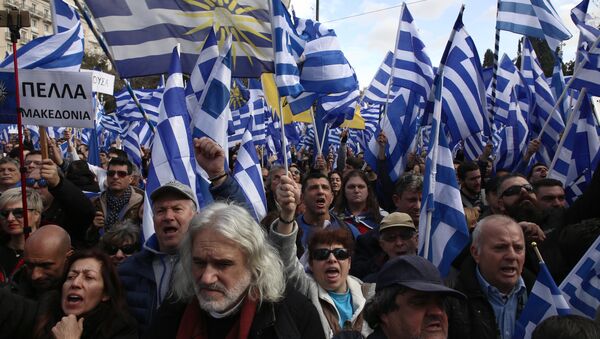Athens has been opposed to Macedonia’s name since its independence in 1991, as there is a Greek region with the same name.
Radio Sputnik talked about the historic vote with Neophytos Loizides, a professor in International Conflict Analysis at the University of Kent.
READ MORE: Over 60% of Greeks Oppose Prespa Deal on Macedonia's Name Change — Poll
Sputnik: How significant is the Greek Parliament's approval of North Macedonia. Perhaps you could also tell our listeners why this particular aspect of this name change is so emotive in that region of the world?
Neophytos Loizides: Exactly, this is highly emotional. Conflict from the Greek point of view, the heritage of Alexander the Great of Macedonia, it's culture, it's something to them that's integral to the formation of Greek identity, and likewise, for the citizens of now-renamed North Macedonia, the name is very important to them, the language is very important and also the right to self-identify the way they would like to. In terms of its importance, it's an extremely historic agreement. Greece has never signed a peace agreement of a similar type for the last 60 years, so it breaks the cycle of conflict and stalemate in the entire Balkan region.
Sputnik: Now, opposition to the new name remains strong among Greeks living in Macedonia, can you just explain why is that? You've mentioned a few things in your introduction but maybe you can just allude a little bit more?
Neophytos Loizides: Exactly, it's a very important territory of Greece, two million Greeks live in that territory, Greek Macedonians. The fear for many of the Greek Macedonians is that the name Macedonia will be eventually monopolised by the neighbours, but this is exactly what the agreement does, it finds constructive ways around the name in order to share it constructively between the two sides.
Neophytos Loizides: Name change is very difficult. We have very few cases of countries changing their names as a result of a request by another state. So politically it's very difficult, but at the same time in the long term it creates a basis for an identity dialogue with Greece, where neither side monopolises the name, where everybody will be, at least at some level, satisfied and it creates the basis of resolving one of the most entrenched identity conflicts in the Balkan region.
Sputnik: Once this begins to settle down can you just explain to us whether there will there be any benefits moving forward economically now for North Macedonia, what's the strategy, what's the mission moving forward to improve quality of life and to get a better relationships with the European Union, etc now?
Neophytos Loizides: Absolutely, this was part of the rationale for this agreement that North Macedonia will become part of the European Union eventually, that would be great for its citizens, both Albanians and ethnic Macedonians. Greece and Bulgaria are already members of the European Union, so that would create tremendous opportunities, so that's a great advantage for all sides in terms of having a landlocked republic, any citizens being able to travel, being able to trade. This is a very important element in terms of maintaining domestic, power-sharing between the two communities in Northern Macedonian, so multiple advantages.
However, nothing is automatic. We've seen the European Union failing in many other conflicts, the question now is for the Europeans, the ball now is on the European side in terms of making credible commitments, supporting the peace agreement, investing in the Balkans and supporting them and doing so in a non-confrontational way that [doesn't] excludes other important powers in the region.
READ MORE: Greek Parliament to Begin Heated Discussions of Name Change Deal With Macedonia
Sputnik: On the flip side, maybe can give us your imbedded knowledge, your expertise with regard to a negative sort of look on this. Is Greece going to have any negativity with regard to this moving forward, maybe from business and the actually economy, is there a downside to this?
Neophytos Loizides: I cannot see a downside in the long term. Agreements of this type eventually serve all sides if they're properly implemented. I think it's a very clear agreement as to what each side has to do in the long run. As I said it shouldn't be seen as a zero-sum game, it's a win-win agreement that shouldn't be seen as exclusive, and it's a mistake to say this is the victory of the West over the East, this is again wrong. So these are potential dangers. In the short-term, of course, any agreement of this type creates polarisation, and the polarisation in Greek politics or in the politics of North Macedonia is not something that favours stability, but difficult decision often require difficult trade-offs and it's also a first step towards reaching broader reconciliation.
The views and opinions expressed by the speaker do not necessarily reflect those of Sputnik.




